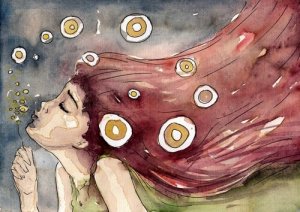The Effects Of Positive Thinking on Happiness

We always want more and more. We think that we’ll be happy when we get a better job, when we move to another house, when we have more holidays, or when we get more money. If you are not happy already, then you probably won’t be either when any of these things happen to you (if they do happen of course). So why not try positive thinking to improve your happiness?
People who don’t know how to enjoy what they already have, are condemned to be slaves to their ambitions. We are desperate to be happy but don’t know how to achieve it. Read on and find on how positive thinking can help us in all this.
This reflection shows us a very common problem, both in people and with different situations. We’ve learnt to be ambitious, to always want more and more, not to settle for what we get and to always try and get more. But what are we forgetting? That the goal is not the summit, and that reaching the top is useless if we haven’t enjoyed the views along the way. Being happy is about the here and now. Because when we get to the summit we won’t be there very long.
“If you aren’t happy with everything you have, you won’t be happy with everything you lack”
-Erich Fromm-
I’m not talking about conformism or of staying in my comfort zone. I want more and I know I can achieve it, but I’ll face the challenge with a smile, and I’ll be able to add to what I already have. If I can feel full with what I have and still want more, I’ll have managed to find the key to success, to my success. It’s all about positive thinking.
“Hope is not found in the when, but in the wait”
-Carlos Andreu-

Positive thinking and visualization
In 1967, the Australian psychologist Alan Richardson conducted an interesting experiment with which he highlighted the power of visualization. In the first phase of the investigation, he told the people who were part of his study sample to shoot baskets, and noted down how many they scored. Later on, he divided this group of people into three subgroups, and the idea was to study how their shooting technique would change during the next twenty days.
The first group spent twenty minutes a day practicing their shooting, but the second group didn’t practice anything. The third group didn’t practice either, but its members spent twenty minutes a day visualizing themselves netting the ball.
After the twenty days were up, Richardson measured the skill of the players again and and found a surprising result. The first group had improved their shot performance by 24%, the second didn’t improve at all, but the third group, those who had practiced visualization, improved by 23%. Positive thinking had had a great effect.
The importance of a good image
Another experiment conducted by Daniel Gilbert, a professor at Harvard University, showed us how we could enjoy the situations that made us happy twice as much. In his experiment a group of people was invited to dine for free at a good restaurant. Everyone could choose the day they would go. The people who delayed the dinner longer were those who reported greater happiness as a result of the experience. They not only enjoyed the evening, but also enjoyed thinking about how much they were going to enjoy it.
What can we conclude from these experiments? That having a good image of ourselves or the things we hope to experience in the future is very important. Achieving goals, enjoying things, setting goals and overcoming challenges can all train our brain to make these challenges easier.
Some theories claim that by wanting something more strongly we are closer to achieving it, but this isn’t what we are talking about. What brings us closer to the goal is to mentally rehearse the procedure to get to the place we want to. This is something that athletes who run speed tests know very well. In the warm-up they mentally rehearse the race again and again – they visualize it with positive thinking.
The fact that practicing something mentally can have similar effects to practicing it in real life is due to some very special neurons: the mirror neurons.

Does what you have already make you happy?
We can spend our whole lives looking for happiness, in the same way that someone searches for metal hidden on the beach or sifts through the sand in search of golden nuggets. We can either only do this or we can try to find a balance where our dreams count for a lot, but so do our positive emotions. These are the emotions that come out of situations when we stop and take a step back to realise what we’ve achieved.
This balance will not only make us feel better now, but it will make it easier for us to deal with our aspirations differently. It will help us to start to see them as something desirable and accessible, but not absolutely essential. It won’t stop motivating us to go on, but it will reduce the impact that any setbacks may have. Can you think of anything that is more valuable than happiness?
“Happiness is like a trick you’re looking for, and when you have it you don’t realize it. It’s retrospective, you realize it later. You can find happiness everywhere, but you have to know how to get it, and to know when you have it”.
-Stephane Brosse-
We always want more and more. We think that we’ll be happy when we get a better job, when we move to another house, when we have more holidays, or when we get more money. If you are not happy already, then you probably won’t be either when any of these things happen to you (if they do happen of course). So why not try positive thinking to improve your happiness?
People who don’t know how to enjoy what they already have, are condemned to be slaves to their ambitions. We are desperate to be happy but don’t know how to achieve it. Read on and find on how positive thinking can help us in all this.
This reflection shows us a very common problem, both in people and with different situations. We’ve learnt to be ambitious, to always want more and more, not to settle for what we get and to always try and get more. But what are we forgetting? That the goal is not the summit, and that reaching the top is useless if we haven’t enjoyed the views along the way. Being happy is about the here and now. Because when we get to the summit we won’t be there very long.
“If you aren’t happy with everything you have, you won’t be happy with everything you lack”
-Erich Fromm-
I’m not talking about conformism or of staying in my comfort zone. I want more and I know I can achieve it, but I’ll face the challenge with a smile, and I’ll be able to add to what I already have. If I can feel full with what I have and still want more, I’ll have managed to find the key to success, to my success. It’s all about positive thinking.
“Hope is not found in the when, but in the wait”
-Carlos Andreu-

Positive thinking and visualization
In 1967, the Australian psychologist Alan Richardson conducted an interesting experiment with which he highlighted the power of visualization. In the first phase of the investigation, he told the people who were part of his study sample to shoot baskets, and noted down how many they scored. Later on, he divided this group of people into three subgroups, and the idea was to study how their shooting technique would change during the next twenty days.
The first group spent twenty minutes a day practicing their shooting, but the second group didn’t practice anything. The third group didn’t practice either, but its members spent twenty minutes a day visualizing themselves netting the ball.
After the twenty days were up, Richardson measured the skill of the players again and and found a surprising result. The first group had improved their shot performance by 24%, the second didn’t improve at all, but the third group, those who had practiced visualization, improved by 23%. Positive thinking had had a great effect.
The importance of a good image
Another experiment conducted by Daniel Gilbert, a professor at Harvard University, showed us how we could enjoy the situations that made us happy twice as much. In his experiment a group of people was invited to dine for free at a good restaurant. Everyone could choose the day they would go. The people who delayed the dinner longer were those who reported greater happiness as a result of the experience. They not only enjoyed the evening, but also enjoyed thinking about how much they were going to enjoy it.
What can we conclude from these experiments? That having a good image of ourselves or the things we hope to experience in the future is very important. Achieving goals, enjoying things, setting goals and overcoming challenges can all train our brain to make these challenges easier.
Some theories claim that by wanting something more strongly we are closer to achieving it, but this isn’t what we are talking about. What brings us closer to the goal is to mentally rehearse the procedure to get to the place we want to. This is something that athletes who run speed tests know very well. In the warm-up they mentally rehearse the race again and again – they visualize it with positive thinking.
The fact that practicing something mentally can have similar effects to practicing it in real life is due to some very special neurons: the mirror neurons.

Does what you have already make you happy?
We can spend our whole lives looking for happiness, in the same way that someone searches for metal hidden on the beach or sifts through the sand in search of golden nuggets. We can either only do this or we can try to find a balance where our dreams count for a lot, but so do our positive emotions. These are the emotions that come out of situations when we stop and take a step back to realise what we’ve achieved.
This balance will not only make us feel better now, but it will make it easier for us to deal with our aspirations differently. It will help us to start to see them as something desirable and accessible, but not absolutely essential. It won’t stop motivating us to go on, but it will reduce the impact that any setbacks may have. Can you think of anything that is more valuable than happiness?
“Happiness is like a trick you’re looking for, and when you have it you don’t realize it. It’s retrospective, you realize it later. You can find happiness everywhere, but you have to know how to get it, and to know when you have it”.
-Stephane Brosse-
This text is provided for informational purposes only and does not replace consultation with a professional. If in doubt, consult your specialist.







